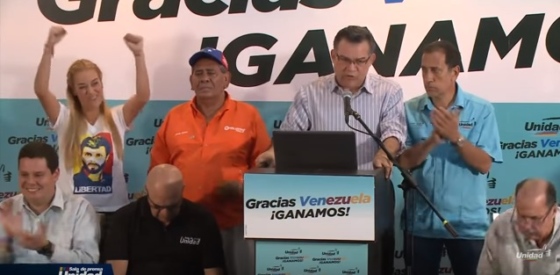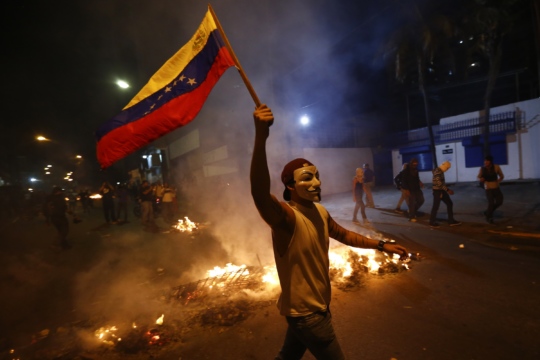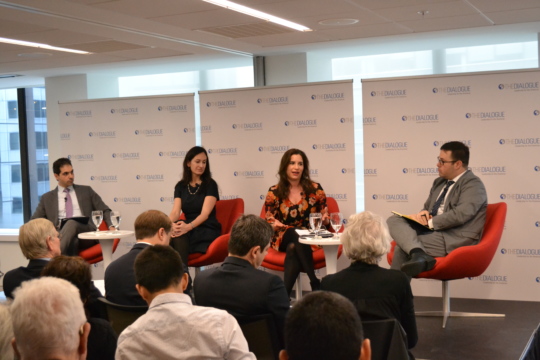
What Does the Future Hold for Venezuela?
What do the election results mean for President Nicolás Maduro and his grip on the presidency?
On April 2, the Inter-American Dialogue hosted Pandemic and Politics in Venezuela, a conference call with Miguel Pizarro, Venezuelan National Assembly member and Commissioner of the Guaidó government for the United Nations, Feliciano Reyna, Founder and Executive President of Acción Solidaria, and Daniella Liendo, Founder of Primeros Auxilios Universidad Central de Venezuela (Green Cross). The discussion was moderated by Michael Camilleri, Director of the Peter D. Bell Rule of Law Program at the Dialogue.
Recent political events, such as the announcement of a transitional framework by US Secretary of State Mike Pompeo, the indictment of Nicolás Maduro, and Juan Guaidó’s call for an emergency government will impact the response to Covid-19 in Venezuela. Pizarro noted that the plan Guaidó made and the framework put forward by the US State Department “is without any doubt a proposal to find a political way out of the situation we are in right now.” He commented that Guaidó and the National Assembly are trying to create a new path towards a political solution, in contrast to the regime that uses the humanitarian emergency to further their own political purposes.
The Covid-19 crisis in Venezuela is also a further strain on an already under-resourced public health system. Camilleri remarked that some are referring to it as an emergency within an emergency, and asked Reyna what he knows about the state of the crisis on the ground. Reyna commented that it is important to reflect on the years of abuse of power that brought Venezuela to its current state. He added, “it is as if we have been hit by a first tsunami wave from which we have not recovered yet, and now we have this second wave that’s probably going to be hitting us in the coming days and weeks and we are definitely not prepared for that.” It is imperative that the 5 million refugees and migrants are aided throughout this crisis, as they support about 30-35 percent of the Venezuelan population who are dependent on remittances. For this reason, refugees’ current lack of access to work is creating a major problem in Venezuela. The country’s issues with food insecurity and community transmission of Covid-19, Reyna also noted, are some of the reasons why civil society is calling for an urgent humanitarian agreement that prioritizes the population.
But the call for a strong humanitarian response is complicated, as it has been for years, by the ongoing political crisis in the country. Reyna commented that the renewed effort outlined by Pizarro requires “an agreement with those who control the terrain and those who are mobilizing from abroad” for it to be implemented with the speed that is necessary. As those plans would take months to execute, Venezuela may begin to look like the dire Covid-19 situation in Ecuador. Pizarro argued that it was precisely these reasons why Guaidó’s interim government is not waiting for a transition or political negotiations to occur to start mobilizing the humanitarian system.
Some of the measures the Maduro regime has taken to mitigate the spread of the virus have been criticized, leaving civil society to fill in the gaps. Liendo remarked that the placement of strategic health centers in the country “have been chosen according to political convenience and not according to the capacity for real care.” In response to how civil society is positioned to support the public health system, she said the Primeros Auxilios UCV (Green Cross) is focused on expanding communication channels to provide key information about the pandemic, and increasing the use of telemedicine to connect patients to doctors.
The event ended with a Q&A session, which included discussions about whether US sanctions should be relaxed against the Maduro regime, and the social impact of closing Venezuela’s borders.
Expertos reclaman "abrir un canal humanitario" para Venezuela ante la crisis por el coronavirus (April 2, 2020 – VOA)
What do the election results mean for President Nicolás Maduro and his grip on the presidency?
An economic and humanitarian crisis, precipitated by the Maduro regime, has brought Venezuela to the brink of collapse.
On April 2, the Inter-American Dialogue in partnership with the Council on Foreign Relations (CFR) hosted an event titled “Venezuela’s Migration Crisis.” This discussion, which was moderated by Michael Camilleri, featured panelists Shannon O’Neil from CFR, Francisca Vigaud-Walsh from Refugees International, and Dany Bahar from the Brookings Institution. This conversation explored the current status of the migration crisis, the US and international community’s response, and the challenges going forward.
 Main Photo: Pixabay / CC0
Main Photo: Pixabay / CC0

 Video
Video